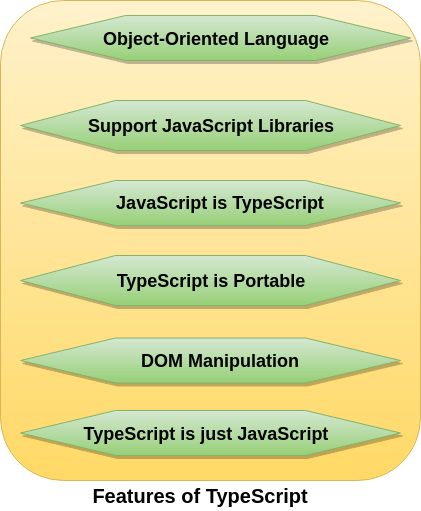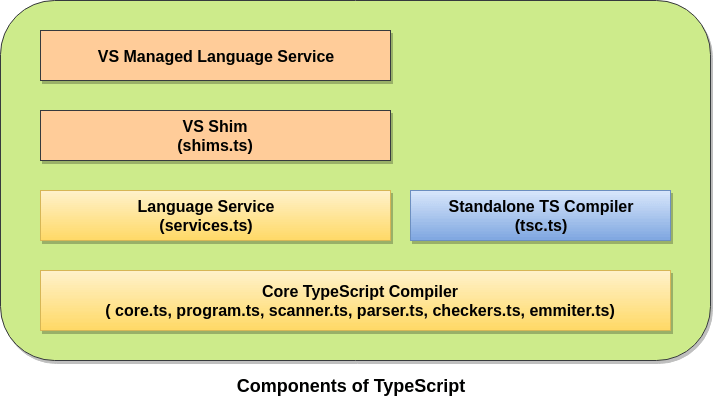TypeScript Certification Online Training
One of the top providers of online IT training worldwide is VISWA Online Trainings. To assist beginners and working professionals in achieving their career objectives and taking advantage of our best services, We provide a wide range of courses and online training.
Learners : 1080
Duration: 30 Days
About Course
TypeScript is an open-source, object-oriented language developed and maintained by Microsoft, licensed under Apache 2 license. TypeScript extends JavaScript by adding data types, classes, and other object-oriented features with type-checking. It is a typed superset of JavaScript that compiles to plain JavaScript.
TypeScript Training Course Syllabus
- Introducing Type Script
- Defining “JavaScript”
- Writing your first TypeScript function
- Configuring Your Environment
- Choosing your TypeScript editor
- Installing Type Script
- Creating a Type Script project
- Reviewing ES6 language features
- Default parameters
- Template strings
- Let and const
- For…of loops
- Lambdas
- Destructuring
- The spread operator
- Computed properties
- Introducing JavaScript types
- Understanding type inference
- Specifying JavaScript types
- Specifying function parameter types
- Adding function overloads
- Defining custom types with interfaces
- Using interfaces to describe functions
- Extending interface definitions
- Defining constant values with enums
- Defining anonymous types
- Understanding prototypical inheritance
- Defining a class
- Applying static properties
- Making properties smarter with accessors
- Inheriting behavior from a base class
- Implementing an abstract class
- Controlling visibility with access modifiers
- Implementing interfaces
- Introducing generics
- Creating generic classes
- Applying generic
- constraints
- Understanding the need for modules in JavaScript
- Organizing your code with namespaces
- Using namespaces to encapsulate private members
- Understanding the difference between internal and external modules
- Switching from internal to external modules
- Importing modules using CommonJS syntax
- Importing modules using ECMAScript 2015 syntax
- Loading external modules
- Introducing the sample JavaScript application
- Converting existing JavaScript code to TypeScript
- Generating declaration files
- Referencing third-party libraries
- Converting to external modules
- Debugging TypeScript with source maps
- Implementing method decorators
- Implementing class decorators
- Implementing property decorators
- Implementing decorator factories
| Live Instructor Based Training With Software |
| Lifetime access and 24×7 support |
| Certification Oriented content |
| Hands-On complete Real-time training |
| Get a certificate on course completion |
| Flexible Schedules |
| Live Recorded Videos Access |
| Study Material Provided |
TypeScript Training - Upcoming Batches
Coming Soon
AM IST
Coming Soon
AM IST
Coming Soon
PM IST
Coming Soon
PM IST
Don't find suitable time ?
CHOOSE YOUR OWN COMFORTABLE LEARNING EXPERIENCE
Live Virtual Training
-
Schedule your sessions at your comfortable timings.
-
Instructor-led training, Real-time projects
-
Certification Guidance.
Self-Paced Learning
-
Complete set of live-online training sessions recorded videos.
-
Learn technology at your own pace.
-
Get access for lifetime.
Corporate Training
-
Learn As A Full Day Schedule With Discussions, Exercises,
-
Practical Use Cases
-
Design Your Own Syllabus Based
TypeScript Training FAQ'S
Microsoft created and maintains Type Script, an open-source programming language that is a statically typed superset of JavaScript. Type annotations and interfaces are added to JavaScript to let developers detect mistakes during compilation instead of at runtime, resulting in code that is safer and more effective.
Because of Type Script’s great scalability, big applications with features like abstract classes, decorators, and namespaces may be developed. Its smooth interaction with contemporary frameworks like Angular, React, or Vue.js and the Java Script ecosystem is one of its greatest advantages, making it a vital tool for any developer trying to build reliable and maintainable online apps.
By learning through VISWA Online Trainings, advance in your job.
| SN | JavaScript | TypeScript |
|---|---|---|
| 1 | It was developed by Netscape in 1995. | It was developed by Anders Hejlsberg in 2012. |
| 2 | JavaScript source file is in “.js” extension. | TypeScript source file is in “.ts” extension. |
| 3 | JavaScript doesn’t support ES6. | TypeScript supports ES6. |
| 4 | It doesn’t support strongly typed or static typing. | It supports strongly typed or static typing features. |
| 5 | It is just a scripting language. | It supports object-oriented programming concepts like classes, interfaces, inheritance, generics, etc. |
| 6 | JavaScript has no optional parameter feature. | TypeScript has optional parameter feature. |
| 7 | It is interpreted language that’s why it highlighted the errors at runtime. | It compiles the code and highlighted errors during the development time. |
| 8 | JavaScript doesn’t support modules. | TypeScript gives support for modules. |
| 9 | In this, number, and string are the objects. | In this, number, string are the interface. |
| 10 | JavaScript doesn’t support generics. | TypeScript supports generics. |
- Most importantly, TypeScript is quick to learn and straightforward to use.
- Features of object-oriented programming, like classes, interfaces, inheritance, generics, etc., are supported by TypeScript.
- Error-checking is provided during compilation by TypeScript. Before the script runs, it will compile the code and, if any mistakes are discovered, indicate them.
- Since TypeScript is the superset of JavaScript, it supports all JavaScript libraries.
- TypeScript uses inheritance to facilitate reusability.
- Because of TypeScript’s tooling support, we can develop apps more quickly and easily and have access to source documentation, autocompletion, and type verification.
- The most recent JavaScript features, such as ECMAScript 2015, are supported by TypeScript.
- All of ES6’s advantages are enhanced with TypeScript’s increased productivity.
- Strong typing, Modules, Optional Parameters, Static typing, and more are supported by TypeScript.


Reviews
Trustindex verifies that the original source of the review is Google. I had a great experience with the Viswa Online Training. The course content was well-structured and covered all the essential topics in a very practical and easy-to-understand manner. The trainer was knowledgeable, approachable, and explained complex concepts with clarity. The mentor was also supportive throughout the training, always ready to guide and clarify doubts whenever needed. Their friendly and encouraging nature created a comfortable learning environment, which made the training even more effective. Overall, I highly recommend this training center to anyone looking to upskill.Trustindex verifies that the original source of the review is Google. Best training institute.Trustindex verifies that the original source of the review is Google. I am grateful for the opportunity to participate training with Viswa Online Training's. The training was highly informative, well-structured, and effectively covered the key concepts. The instructor's expertise and interactive approach made the learning experience engaging and practical.Trustindex verifies that the original source of the review is Google. Excellent training to immerse in Snaplogic. Benefiting from Trainer Subbu knowledge is a privilege.Trustindex verifies that the original source of the review is Google. Nice training institute. Thanks chaitanyaTrustindex verifies that the original source of the review is Google. VISWA Online Trainings is best IT training provider for SharePoint SPFX Training and best faculties with lot of patience and practical experience. Best place to work excellent training by experienced faculties awesome tech support.Trustindex verifies that the original source of the review is Google. It was a great learning experience for Oracle Apps DBA, Trainer has handy experience in the subject also his teaching style was perfect to grasp the knowledge. Study materials, Software and sample practical problems provided was excellent. I'll recommend VISWA Online Trainings for Apps DBA, already I have recommended to my friends and collogues.... Thanks, Chaitanya, for a great learning experience.Trustindex verifies that the original source of the review is Google. The introduction to SAP Ariba with Rohith and the experience were wonderful. The instructor was really helpful and skilled. The course material was thoroughly and credibly covered. Many thanks, Team.Trustindex verifies that the original source of the review is Google. Excellent way of delivering concepts and PowerShell Online Training.


